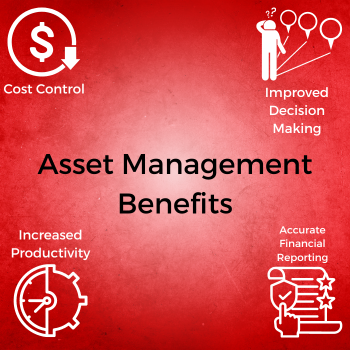Corporate asset tracking helps business operations, enhances efficiencies, reduces costs, improves customer satisfaction and ensures regulatory compliance.
- Optimize Asset Utilization - asset tracking enables businesses to monitor the location, status and usage of their assets in real time. This information helps companies to make informed decisions about how to allocate and utilize their assets efficiently, ensuring that assets are used to their fullest potential.
- Cost Savings - Efficient asset tracking can lead to significant cost savings by preventing loss, theft or misplacement of valuable assets. It also helps to avoid unnecessary purchases of duplicate assets because businesses can accurately determine whether an asset is already available within the organization.
- Enhancing Productivity - Using business asset tags, businesses can streamline processes such as maintenance, servicing and repairs. Timely maintenance of assets can prevent downtime, prolong asset lifespan and keep operations running smoothly, ultimately boosting productivity.
- Improving Decision Making - Access to real-time data allows companies to identify bottlenecks, allocate resources effectively and adjust strategies based on accurate information.
- Forecasting and Planning - Accurate corporate asset tracking data provides insights into usage patterns, allowing businesses to forecast demand and plan for future asset requirements. This can help to avoid shortages and ensure that the necessary resources are available when needed.
- Supply Chain Optimization - Asset tracking for businesses can be particularly important in supply chain management. It helps track the movement of goods and materials throughout the supply chain, enabling better coordination, reduced lead times and improved inventory management.
Corporate asset tracking empowers businesses to make data-driven choices that lead to increased profitability and competitiveness.

What is the Difference Between Asset Tracking and Asset Management?
Asset tracking and asset management are related concepts, but they serve different purposes within a business context.
What is Asset Tracking? 
Asset tracking refers to the process of monitoring the physical location and status of assets in real time. It involves using technologies such as radio frequency identification (RFID) and barcodes to keep tabs on the whereabouts and conditions of assets as they move within an organization or through the supply chain. The primary goal of asset tracking is to provide accurate and up-to-date information about an asset's location, usage, maintenance history and other relevant data points.
What is Asset Management?
Asset management, on the other hand, encompasses a broader set of activities that involve planning, acquiring, using, maintaining and disposing of assets throughout their lifecycle. It involves strategic planning and oversight of assets to ensure they provide maximum value to the organization over time. Asset management focuses on optimizing the entire lifecycle of assets, from procurement and deployment to retirement or disposal.
Both asset tracking and asset management are crucial for businesses to efficiently and effectively manage their physical resources and ensure long-term success.
Why is Asset Management Important to Businesses?
Asset management is crucial to businesses, as it helps organizations to optimize their operations, reduce costs, mitigate risks, enhance decision making and achieve long-term sustainability.
- Optimizing Asset Utilization - effective asset management enables businesses to maximize the utilization of their assets throughout their lifecycle.
- Cost Control and Reduction - proper asset management helps control costs by minimizing maintenance and repair schedules. It also helps identify assets that are no longer cost-effective or efficient, allowing for timely disposal or replacement.
- Improved Decision Making - Asset management provides valuable data and insights that support informed decision-making. Businesses can use asset data to determine when to repair or replace assets, allocate resources effectively and plan for future asset needs.
- Enhanced Regulatory Compliance - Many industries have regulations and standards governing the management and maintenance of assets. Effective asset management ensures that assets are properly maintained, inspected and documented, reducing the risk of compliance issues and penalties.
- Increased Productivity and Efficiency - Well-managed assets lead to improved operational efficiency and productivity. Regular maintenance and timely repairs reduce downtime, while optimized asset allocation and usage streamlines workflows and processes.
- Accurate Financial Reporting - Assets are a significant component of a company's financial statements. Effective asset management ensures that asset valuations, depreciation and other financial data are accurately tracked and reported, contributing to transparent and reliable financial reporting.
In summary, a well-executed asset management strategy can provide a competitive advantage by enabling businesses to operate more efficiently, offer better service and adapt to changing market conditions more effectively. For more information on asset tracking for businesses, please contact Metalcraft at 800-437-5283 or [email protected].
 | About the Author: Marianne AlvaradoMarianne Alvarado is our Vice President of Sales. Alvarado joined Metalcraft in March of 2000 as a Territory Specialist, became Sales Manager in January 2022 and was named Vice President of Sales during August of 2023. She leads both the Outside and Inside Sales teams. Marianne lives in Davenport with her husband, Dave Beeman. Mobile Phone: 641-529-9492 Email: [email protected] Office: 3360 9th St. SW, Mason City, IA 50401 Office Phone: 641-423-9460 |



